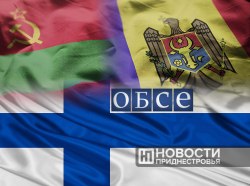Procedure moment
The examination of a Russian candidate for the JCC was following a 20-year-old procedure. On 24 September an extraordinary meeting was opened, and its agenda was not disputed by any side. A Russian officer was called to the meeting room to be introduced to the commission. As usual, the candidate told the JCC members his military record, answered their questions, including those asked by Moldovan delegates. This is where the procedure usually finishes. There is, however, a little procedural «but» — there must be signatures under a record of the meeting, otherwise any agreements are void.
The Moldovan delegation, led that day by the acting co-chair, Sergiu Golovaci, refused without giving any reason to approve a new JCC member, asking for a week time-out. Eight meetings have taken place since then, and things are right where they started.
By the way, back then, following the meeting of 24 September, Tiraspol officials expressed concern about this decision, referring to it as a dangerous precedent. It is not that such incidents, when the approval of a candidate was blocked by this or that side, have never occurred, although they used to arise between conflict sides only and have never involved Russia as a guarantor state.
New «world order» as seen by Moldova
Since this July, and in fact much earlier, Ukraine has blocked the transit through its territory of both cargoes for the Russian peacekeepers in Pridnestrovie and servicemen themselves. In their turn, the Moldovan authorities apparently decided to take advantage of the situation and began to filter right on the arrival in Moldova the Russian military assigned by Russia's defence ministry to serve in the security zone of the Moldo-Pridnestrovian conflict. Dozens of Russian officers had to finish their peacekeeping mission at Kishinev airport.
These actions are the direct breach of the framework Agreement of 1992 on principles of peaceful settlement. In this regard, it should be mentioned that in compliance with Article 2 of the 1992 Agreement the military contingents, formed of volunteers, representing the parties of this agreement, which establishes the number, status, terms of introduction and withdrawal of military contingent in and from the conflict zone, are subordinate to the Control Commission. Article 4 of the 1992 Agreement obliges both parties of the conflict to keep away from any unlawful acts towards munitions, servicemen and members of their families. Besides, such actions rudely violate agreements and decisions made within the JCC, namely Provision 4 of Enclosure 1 to Protocol 4 of 30 July 1992: «The parties are obliged to perform the rotation of all categories of troops within their contingents according to plans and requirements of the Joint Military Command in the conflict zone.»
To make their actions look legitimate, Moldova's JCC delegation went on an unprecedented fraud. At one of the very last meetings, the above mentioned acting co-chair, Sergiu Golovaci, said he did not know about the deployment of the Operational Group of Russian Forces in the region. There you are with a new peacekeeping order as seen by Moldova.
Role reversal
Turning back to Moldova's refusal to approve a Russian JCC candidate, we highlight the tactics the Moldovan delegation has been employing for almost two months. After a week's time-out, Moldova's JCC delegates finally announced their decision. The refusal was explained by the infringements allegedly revealed by the customs service on the officer's arrival in Moldova. There were no concrete facts. The document which was sent by Moldova's foreign ministry to its Russian counterpart has not been seen by anyone in the JCC. That begs the question: how does it concern the approval of a new member? Only the Joint Control Commission has had the corresponding competence so far.
After that, the Moldovan delegation recused itself, laying the blame on Moldova's foreign ministry. And, of course, nobody cared to invite officials entitled to solve such issues.
Another issue, suddenly coming out beyond the competence of Moldovan negotiators, was monitoring the readiness of peacekeeping checkpoints for the autumn-winter period. These functions, among others, have always been placed on the JCC.
«The Pridnestrovian delegation also issued a statement, backed by the Russian party, on the necessity of a recurring monitoring of peacekeeping checkpoints in the South Sector of the Security Zone. It should be noted that the readiness of peacekeeping checkpoints for the autumn-winter period had already been assessed by the Joint Military Command, whose competence comprises these obligations. No infringements capable of obstructing checkpoints' activities had been detected, and correspondingly there was no need to visit them," report the Moldovan media, referring to a press release by the reintegration bureau.
Note that it is not the Moldovan delegation to the JCC that comments, but the reintegration bureau. Moldovan journalists are likely to have referred to a more competent body…
However, the Moldovan delegates to the JCC are ready to solve issues that are beyond the JCC's competence. Apparently, while diplomats perform peacekeeping duties, the members of the commission have been empowered to deal in politics.
In defiance of the regulation (the members of the Moldovan delegation must know that without closing an extraordinary meeting main agenda issues cannot be considered!), the Moldovan delegation insists on considering freedom of movement issues.
The Pridnestrovian delegation focused on the fact that this aspect does not fall under the jurisdiction of the JCC and is considered at other negotiation platforms. It was specially emphasised that the freedom of movement issue is many-sided.
«Following the logic of the Moldovan delegation to the JCC, the commission should also consider issues relating to the restrictions on passenger trains transit through Pridnestrovie, full restriction on the activities of Pridnestrovie's Tiras-avia air company, nearly full restriction on passenger vehicles registered in Pridnestrovie going abroad. Moreover, Moldova is restricting Pridnestrovie's exports and imports: importing products and raw material to Pridnestrovie is restricted; exporting Pridnestrovie's production is considerably restricted; Pridnestrovie's businesses are compelled to register in Moldova, which leads to double taxation and makes their production noncompetitive. This is nothing less than an attempt of economic suffocation of Pridnestrovie, which in no way supports conflict resolution. Besides, Moldova restricts the movement of services in Pridnestrovie, including the development of telephone and TV communications, i.e. «creates obstacles for Pridnestrovie's cellular operator, post service and mass media," said Oleg Belyakov, Pridnestrovie's co-chair in the JCC.
The Moldovan side regards Pridnestrovian law enforcers' posts as an obstacle to the freedom of movement and seeks to monitor these very posts. Besides, this monitoring should be performed by OSCE representatives and, what is more, it cannot in any way concern similar Moldovan posts in the Security Zone. Pridnestrovie, in its turn, insists on the parity in this respect.
When this problem will be solved and when a compromise will be reached on other aspects concerning the peacekeeping operation remain to be seen. In many respects, this will depend on the strong will and, of course, the competence of the country that committed itself in 1992 to switching from hostilities to peaceful settlement.
Pavel Mirov








